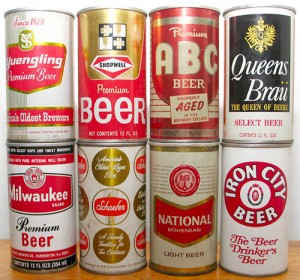I’m freaked out that I’m going to gain all my weight again but I can’t stop myself.
That’s one of the lines in an email from Sarah, 24, that really stood out for me. Why? Because I remember being there. I remember coming off of a “successful” diet when I was 19, feeling thin and in control, then falling “inexplicably” into bingeing. Day after day, bingeing, bingeing, bingeing, until I had gained all the weight back and more.
The thing is, that binge reaction wasn’t inexplicable. Bingeing is an absolutely normal response to dieting and deprivation. Even people who are normal about food to begin with find that they have the urge to binge after being deprived! In fact, scientists who study binge eating and obesity often turn rats and mice into binge eaters in order to study them…and guess how they do that? Giving them servings of their favorite (usually sugary or chocolatey) food then taking it away over and over. The next time they get a hold of that food, they cram it in like there’s no tomorrow. (Sound familiar anyone?!)
Anyhow, let me run the rest of Sarah’s letter so we can get to the happier, more hopeful part!
Q: I’m currently struggling with food and body image right now and I’m frustrated because I can’t find a psychiatrist in my area who specializes in eating disorders. At my heaviest weight in 2004 I weighed 210lbs which I lost through Weight Watchers. I maintained 130lbs for about two years but something snapped and I took weight loss too far. My doctor diagnosis me as anorexic a year and a half ago (a year of which I followed a vegan diet). My lowest weight was 100lbs (I’m 5’4) but typically averaged 106-108lbs during that year and a half. However in the past month I’ve had huge bingeing episodes and gained 10lbs (which I needed to but not in this manner). I’m still working out 6 days a week (hour plus of cardio plus weights) and I’ve binged the past 8 days in a row. I’ve left my apartment to go walk to CVS at midnight to buy candy (I haven’t really bought myself candy or any junk food since joining WW in 2004).
I’m freaked out that I’m going to gain all my weight again but I can’t stop myself. I feel confident during the day but around 9pm I just go crazy and I will walk to the store to get food to eat. Or just eat whatever I have (last night part of my binge included two bowls of oatmeal). I’ve been trying to find a psychiatrist who takes my insurance who I’m compatible with and I can’t find anyone. I’m frustrated and lonely and I’m hoping you can offer me words of wisdom. I have the book Intuitive Eating and Why Weight and I’m reading them while I’m bingeing (WHO DOES THAT). Thank you so much for reading this. And if you have any advice I’d gratefully appreciate it.
A: Hi Sarah. First, take a really deep breath and know that all of this back and forth, this weird, winding, crazy road is OK. Most people who get sane about food and recover from disordered eating don’t just get there in one straight shot. Your experiences—including your binges—have all gotten you where you are right now, looking hard for the next step because you very much want to get all the way better.
I bolded a couple of lines in your email, above, because I think they provide a lot of insight into what’s going on. Do you think your body and heart might be trying to tell you something? During the day, when you’re feeling confident about eating, is it possible that you’re still “restricting” in some way? Not necessarily calorie-wise, but in any way? You obviously have had some pretty strong feelings about which foods are “healthy” and which are not. Could it be that you are still putting a lot of pressure on yourself to eat “perfectly” and “healthily”? If so, it’s not a huge surprise that your body is rebelling at night. In fact, your subconscious may be trying to save your life! It’s like, “NO. NO MORE.” It doesn’t want you to be obsessed anymore. It doesn’t want you to think about weight and numbers constantly. Your body, through this bingeing, is forcing you to look for a type of recovery and help that is beyond anything you’ve sought before.
That’s something I came to believe very firmly through my recovery: My urge to binge was my body’s way of telling me something was up. It kept me striving for sanity because it made me so miserable I couldn’t ignore it! So don’t ignore it! You’ve been trying on your own with books like Intuitive Eating and Why Weight, but maybe your body is trying to tell you it’s time to take the next steps in your journey.
Speaking of next steps, it sounds like you’ve been trying to find a psychiatrist. Good! But since you haven’t found one you love yet who specializes in eating disorders, here are a couple of other things you can do:
1. Check into psychiatrists or psychologists at large university medical centers near you. Big colleges often have the most cutting-edge therapists. Even better, they often offer discounted therapy with masters-degree-level students who are doing practicum work under the supervision of experienced specialists.
2. Search EDReferral.com, or Something Fishy for eating disorder therapists in your area.
3. Look into eating disorder clinics near you that may offer outpatient therapy. The Renfrew Center, for example, has locations in Florida, NY, Texas, and Maryland among other places. Their therapists are amazing.
4. Expand the type of expert you’re looking for. Have you ever considered cognitive behavioral therapy? There is solid evidence that CBT works in binge eating. (Try Googling”cognitive behavioral therapists in XX city.”)
5. Know that even if the therapist you choose doesn’t take your insurance, you can often send in your receipts for reimbursement from your insurance company. Insurance companies must cover mental health at the same benefit level as “medical” health, which means that if your company covers 65% of out-of-network costs for regular docs, it’ll cover 65% for mental health people, too.
You’re on your way, Sarah. And it sounds like you are determined to get better (and that your body is loudly pushing you toward it!).
Now, to the rest of the HealthyGirl.org community: If you’ve seen a therapist, how did you find him or her? How did you pay for it? How did it help? What other wisdom can you share with Sarah? xo…Sunny






Great suggestions Sunny! Also remember when looking for a therapist to check out eating disorder nonprofit organization websites. Our organization, the Binge Eating Disorder Association (BEDA) for instance has a national database of its treament providers that anyone can search at http://www.bedaonline.com. Other organizations like the National Eating Disorders Association and the Academy for Eating Disorders also have databases. Check for state based organizations as well. In Maryland an organization called The Eating Disorder Network of MD provides a listing of treatment providers in MD. Always feel free to call these organizations as well. They exist to help individuals with eating disorders however mild or severe.
Hi Chevese! Yes, you’re absolutely right that non-profit associations are a great place to start. Thanks for reminding me and weighing in. Go BEDA! xo…Sunny
I have been really lucky in that my last therapist was through the university I go to. I didn’t have to pay and she was actually an incredible therapist. I was also able to be part of an eating concerns support group and loved it. Have you considered finding an overeater’s anonymous group? Maybe the group leader can point you in the right direction for a therapist.
If anything, money should not be an issue. What good is your money if you aren’t healthy and happy enough to use it?
Hang in there. The fact that you are reaching out is INCREDIBLE.
I found a lot of great help in recovery groups like overeaters anonymous. Sometimes it was more helpful than te therapists. You get a complete support network that you can utilize even after the session is over. Plus, the people have “been there”. Important tip: Stick with the winners, or anyone who has the recovery that you want
I was in the same boat earlier this year. There was only three people who had any experience with eating disorders where I lived, and I could only see one of them. Long story short we were not compatible, so I went back to a therapist who I had a great connection with who did specialize in CBT. I also checked a lot of blogs-especially those on intuitive eating-and soon developed a small but growing network of support. I found on one of those blogs a health coach who has been helpful in teaching me why I binge and how better to deal with my emotions without turning to food.
Keep trying. Reach out, like you already did, and you’ll be surprised how quickly things fall into place. I was surprised when I mentioned I was seeing a therapist to the people around me how many friends began recommending therapists who they thought would be compatible with me.
I work within a counselling service, as well as trying to move forward from disordered eating (and thinking!) myself.
Sometimes, a counsellor or therapist isn’t the one for you. It’s important to find someone you’re comfortable with. It’s also important to recognise that sometimes, a professional will say things you don’t really want to hear. This is very different from someone not being for you. Often, clients want to switch counsellors until they find someone who says what they want to hear and this is really not the point of therapy. So choose carefully but be open to give it a go or two with someone, because it might surprise you how well you work together.
I’ve had three different therapists over the years, each different to the last. I’ve noticed that different people work well together at different times.
It’s also important to remember therapy is about work - and you doing most of it! They won’t give you a magic fix or cure-all. Some will help you explore past issues that might explain where you are now. Some will offer techniques to try. I found that I had to spend a year with the first person not doing the work but merely surviving; a couple of months with the second drawing a close (as far as possible) to family issues and the third I am currently seeing and I am working my ass off!
Also don’t expect to magically ‘get better’. It doesn’t work like that. It’s a process we have to keep working on for the rest of our lives, getting easier as time goes and less effort. Letting go of there being a point of ‘recovery’ helped me to take the pressure off and know I was doing fine.
The Association for Behavioral and Cognitive Therapies (ABCT) has a “therapist finder” and one of the specialties you can search by is eating disorders.
http://www.abct.org/Members/?m=FindTherapist&fa=FT_Form&nolm=1
Thank you all so much for your comments and suggestions! Everyday is a struggle and your thoughts are motivating me to seek out the help I need. Thank you thank you so much. It’s wonderful to realize that you are not alone in your struggle.
[…] There is a way out! It can be tough, and it can take a years for some of us, but if you keep going, keep seeking help and trying new steps toward recovery, you can be free of bingeing and food obsession. Did […]
[…] for your recover, whether it’s books, support groups, inpatient eating disorder treatment, or therapy. Your mom, as much as she loves you, can’t fix this (especially since you haven’t even […]